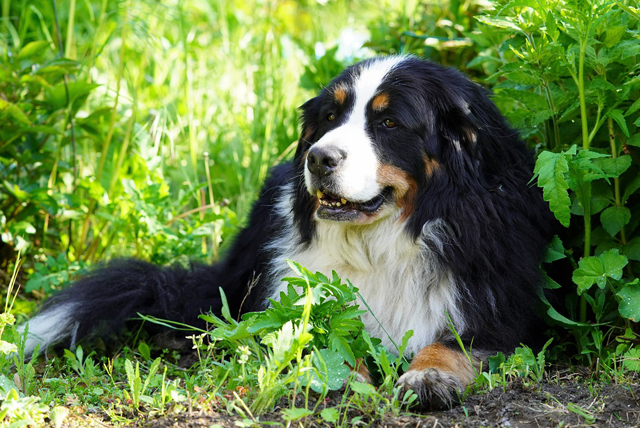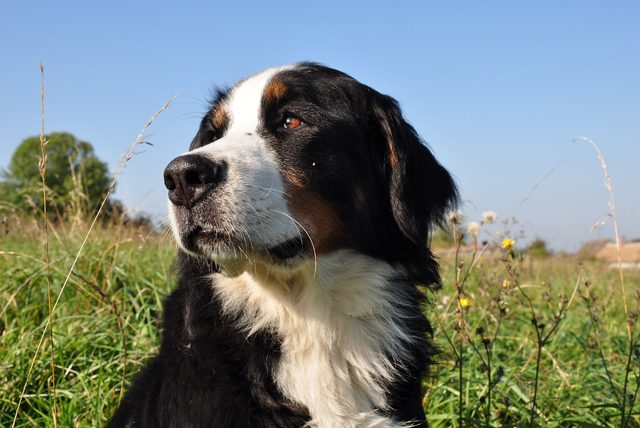iHeartDogs is reader-supported. When you buy via links on our site, we may earn an affiliate commission at no extra cost to you.

There’s more to the Bernese Mountain Dog than his looks, though you can’t help but swoon at the breed’s luscious fur and regal stature. These big floofs are gentle sweethearts who inevitably insist on being lap dogs despite their size. Bernies also make great hiking companions and siblings to older kids.
Unfortunately, the Bernese Mountain Dog breed is predisposed to certain medical conditions, especially due to their size. While these health issues can be expensive to treat, you may be able to cover the high costs if you invest in pet insurance for your dog early.
It’s easy to feel overwhelmed when it comes to choosing the right pet insurance plan for your beloved Bernie. This guide will help you select a plan that covers everything you want it to, so you can be there for your dog when they need you most.
Compare The Top 9 Pet Insurance Plans for Your Bernese Mountain Dog Using our Free No-Obligation Quote Tool below
The simplest way to compare pet insurance prices is to use our tool below. The comparison tool will show you quotes from the top 9 pet insurance carriers, including Trupanion, Pets Best, Lemonade, ManyPets, FIGO, HealthyPaws, Prudent Pet, Spot, and Embrace pet insurance.
[HLM_Insurance_Widget placement_name=‘BerneseMountainDogArticle’ placement_id=‘1’ campaign=‘BerneseMountainDogArticle’]
How Much Does Pet Insurance for a Bernese Mountain Dog Cost?
Below are some sample pet insurance plans for a 1-year-old male Bernese Mountain Dog using the zip code 75001 (Texas) as an example.
- Pets Best – $104.75 per month
- Embrace – $76.60 per month
- Healthy Paws – $81.34 per month
- ManyPets – $95.79 per month
Ultimately, your plan’s premium will depend on several factors, including your dog’s age, size, and breed, as well as where you live. You also want to know what type of coverage your plan has and if it will help with Bernese Mountain Dog-specific health problems. Let’s get more into those medical conditions and how much you can expect to pay to treat them.
Common Health Problems Associated With Bernese Mountain Dogs
Histiocytic Sarcoma in Bernese Mountain Dogs
Also known as malignant histiocytosis, this is the most common cancer seen in Bernese Mountain Dogs. Sadly, it is a very aggressive form of cancer. Symptoms that the cancer has spread (referred to as “disseminated”) include:
- Loss of appetite and weight loss
- Weakness and lethargy
- Abnormal breathing or coughing
Dog parents should be prepared that prognosis for this type of cancer is relatively poor, as not all affected dogs respond to treatment, and disseminated histiocytic sarcoma can spread very quickly.
Von Willebrand’s Disease (vWD) in Bernese Mountain Dogs
Von Willebrand Disease (vWD) is an inherited bleeding disorder where a vital protein involved in blood clotting is absent. In Bernese Mountain Dogs, vWD is an autosomal recessive trait.
Some dogs carry the trait without experiencing symptoms. Others may suffer spontaneous bleeding from the nose, mouth, or digestive or urinary tracts. Teething or infections may also cause bleeding.
Dogs with this condition should not take drugs that affect normal blood clotting. There is no cure, but the condition can be managed to reduce the likelihood of severe complications.
Hip Dysplasia in Bernese Mountain Dogs
Hip Dysplasia is one of the most common problems in larger breed dogs, and Bernies are pretty large: these dogs can weigh between 85 and 110 pounds. The hip joint is a ball and socket joint, and hip dysplasia causes malformation of the two components. That makes it difficult for your dog to walk, and the chronic laxity can cause abnormal wear, which leads to osteoarthritis.
The earlier you have your Bernese Mountain Dog diagnosed, the better their outcome will be. Pet insurance often covers annual exams. If the condition worsens, it may require surgery.
Gastric Torsion (a.k.a. “Bloat”) in Bernese Mountain Dog
Gastric Torson (a.k.a “bloat”) occurs when your dog’s stomach fills too rapidly with gas, food, or fluid. Bloat is a sudden, life-threatening condition where the stomach can twist, blocking the organ’s entrance and exit. It can even obstruct blood flow, which is a medical emergency.
Larger dogs like the Bernese Mountain Dog are more likely to suffer from this condition. Early diagnosis and treatment are essential when it comes to gastric torsion. Preventative measures, like regular exercise, proper diet, and not eating or drinking too quickly help as well.
If you notice any of these warning signs, you should take your Bernie to the vet right away:
- Swollen belly
- Rapid heartbeat
- Difficulty breathing
- Collapse
Typical Costs Of Treating Health Issues In Bernese Mountain Dogs and How Pet Insurance Can Help
If left untreated, many of the health conditions listed above can result in long-term consequences and even require surgery, which ultimately makes them more expensive to manage. Selecting a pet insurance plan suited for your Bernie’s particular needs might save you tons of money on medical costs.
Here are just some sample veterinary expenses for Bernese Mountain Dogs:
- Histiocytic Sarcoma Costs: The costs of treating this cancer will depend on whether it’s localized or if it has spread and whether successful treatment is even possible. Diagnosis will likely involve blood tests, urinalysis, X-rays, and ultrasounds to check organs for tumors, which will cost hundreds of dollars. Chemotherapy treatments range in price from $200-$400 per treatment, and ongoing radiation therapy could cost $1,000 to $5,000. Surgery will also hit you with a bill in the low thousands.
- Von Willebrand’s Disease Costs: While there’s sadly no cure for this disease, dogs with vWD can live perfectly normal lives with management and avoidance of risky activities. If your dog has severe bleeding due to an injury, it may require a blood transfusion. This typically costs $100 to $300 per unit.
- Hip Dysplasia Costs: The cost of surgery for hip dysplasia can range from $4,000 to $6,000 per hip. Surgical options include Triple Pelvic Osteotomy, Femoral Head Osteotomy, and Juvenile Pubic Symphysiodesis, all costing thousands of dollars. Without surgery, your dog will suffer discomfort and eventually severe pain.
- Gastric Torsion (“Bloat”) Costs: If your dog’s stomach has twisted, it will probably need emergency surgery to untwist it. The average cost of treating a bloat case with surgery runs between $2,000 and $5,000. If there are complications, the cost could be even higher. Pet insurance with emergency coverage can literally be life-saving in this case.
Knowing the signs and symptoms of these conditions common in Bernese Mountain Dogs can help you catch them early, saving your dog and your money. When in doubt, take your pup to the vet to have them diagnosed.
What Is Pet Health Insurance And Why Do I Need It For My Bernese Mountain Dog?
Pet health insurance works very similarly to human health insurance. Your policy quote will range in monthly price, depending on your dog’s breed, age, and where you live. Typically, you’ll spend around $15-$161 per month as a pet parent.
Pet insurance is mainly about peace of mind, knowing you won’t be totally overwhelmed in case of an emergency. Enrolling even when your dog is young and healthy will ensure you have plenty of coverage when they need expensive medical care later. If you choose a plan more suited to your dog’s particular breed, you’ll be more prepared when something happens later on in their life.

Some plans cover accidents and illnesses, while others only cover accidents. Certain plans do cover breed-specific illnesses, and others do not. It all depends on what type of coverage you choose. With our free pet insurance comparison tool, you can get quotes from multiple insurance companies with no obligation to commit.
[HLM_Insurance_Widget placement_name=‘BerneseMountainDogArticle’ placement_id=‘2’ campaign=‘BerneseMountainDogArticle’]
Whatever plan you choose, you’ll feel better knowing you can take care of your dog when they need you most. Plus, you won’t have to suddenly shell out thousands of dollars. Learn more about how pet insurance works here.
Pet Insurance Carrier Comparisons
- 9 Best Pet Insurance Plans for Dogs
- Best Cheap Pet Insurance
- Trupanion Vs. Pets Best Pet Insurance
- Trupanion Vs. Lemonade Pet Insurance
- HealthyPaws Vs. Embrace Pet Insurance
- HealthyPaws Vs. Trupanion Pet Insurance
- Embrace Vs. Trupanion Pet Insurance
- Embrace Vs. Lemonade Pet Insurance
- Trupanion Vs. FIGO Pet Insurance
- Prudent Pet Vs. Trupanion Pet Insurance
- Embrace Vs. ManyPets Pet Insurance
- Embrace Vs. FIGO Pet Insurance
- Prudent Pet Vs. Embrace Pet Insurance
- HealthyPaws Vs. ManyPets Pet Insurance
- HealthyPaws Vs. FIGO Pet Insurance
- Prudent Pet Vs. HealthyPaws Pet Insurance
- HealthyPaws Vs. Lemonade Pet Insurance
- Pets Best Vs. ManyPets Pet Insurance
- Pets Best Vs. FIGO Pet Insurance
- Prudent Pet Vs. ManyPets Pet Insurance
- Prudent Pet Vs. Pets Best Pet Insurance
- Embrace Vs. Pets Best Insurance
- HealthyPaws Vs. Pets Best Pet Insurance
- ManyPets Vs. Lemonade Pet Insurance
- Lemonade Vs. FIGO Pet Insurance
- Trupanion Vs. ManyPets Pet Insurance
- ManyPets Vs. FIGO Pet Insurance
- Lemonade Vs. Pets Best Pet Insurance
- Prudent Pet Vs. Lemonade Pet Insurance
- Prudent Pet Vs. FIGO Pet Insurance
Breed Pet Insurance
- Pet insurance for Akitas
- Pet insurance for Alaskan Malamutes
- Pet insurance for American English Coonhounds
- Pet insurance for American Staffordshire Terriers
- Pet insurance for Australian Cattle Dogs
- Pet insurance for Australian Shepherds
- Pet insurance for Basset Hounds
- Pet insurance for Beagles
- Pet insurance for Bernese Mountain Dog
- Pet insurance for Bichon Frises
- Pet insurance for Bloodhounds
- Pet insurance for Border Collies
- Pet insurance for Boston Terriers
- Pet insurance for Boxers
- Pet insurance for Bulldogs
- Pet insurance for Bullmastiffs
- Pet insurance for Bull Terriers
- Pet insurance for Cane Corsos
- Pet insurance for Cavaliers
- Pet insurance for Chesapeake Bay Retrievers
- Pet insurance for Chihuahuas
- Pet insurance for Chinese Crested Dogs
- Pet insurance for Chow Chows
- Pet insurance for Cocker Spaniels
- Pet insurance for Collies
- Pet insurance for Corgis
- Pet insurance for Dachshunds
- Pet insurance for Dobermans
- Pet insurance for Dogue De Bordeaux
- Pet insurance for English Springer Spaniels
- Pet insurance for French Bulldogs
- Pet insurance for German Shepherds
- Pet insurance for German Shorthaired Pointers
- Pet insurance for Goldendoodles
- Pet insurance for Golden Retrievers
- Pet insurance for Greyhounds
- Pet insurance for Great Danes
- Pet insurance for Great Pyrenees
- Pet insurance for Havanese
- Pet insurance for Huskies
- Pet insurance for Jack Russells
- Pet insurance for Labrador Retrievers
- Pet insurance for Labradoodles
- Pet insurance for Lhasa Apsos
- Pet insurance for Maltese
- Pet insurance for Mastiffs
- Pet insurance for Miniature Pinschers
- Pet insurance for Mixed Breeds (small)
- Pet insurance for Mixed Breeds (medium)
- Pet insurance for Mutts
- Pet insurance for Newfoundlands
- Pet insurance for Old English Sheepdogs
- Pet insurance for Papillons
- Pet insurance for Pekingese
- Pet insurance for Pit Bulls
- Pet insurance for Pomeranians
- Pet insurance for Poodles
- Pet insurance for Pugs
- Pet insurance for Rhodesian Ridgebacks
- Pet insurance for Rottweilers
- Pet insurance for Saint Bernards
- Pet insurance for Samoyeds
- Pet insurance for Schnauzers
- Pet insurance for Shar-Peis
- Pet insurance for Shelties
- Pet insurance for Shiba Inus
- Pet insurance for Shih Tzu
- Pet insurance for Staffordshire Bull Terrier
- Pet insurance for Vizslas
- Pet insurance for Weimaraners
- Pet insurance for Westies
- Pet insurance for Whippets
- Pet insurance for Yorkies
Pet Insurance by City
- Pet Insurance in San Diego
- Chicago Pet Insurance
- New York City Pet Insurance
- Pet Insurance in Seattle
- Pet Insurance in Los Angeles
- Pet Insurance in Austin
- Pet Insurance in San Antonio
- Pet Insurance in Miami
- Pet Insurance in Philadelphia
- Pet Insurance in Sacramento
- Pet Insurance in Orlando
- Pet Insurance in San Francisco
- Pet Insurance in Houston
- Pet Insurance in Dallas
- Pet Insurance in Tampa
- Pet Insurance in Pittsburgh
Pet Insurance by State
- Pet Insurance in California
- Pet Insurance in Texas
- Pet Insurance in Florida
- Pet Insurance in Pennsylvania
- Pet Insurance in Washington State
- Best Pet Insurance in Michigan
- State of Delaware Pet Insurance
- Pet Insurance in NC
- Pet Insurance in NJ
- Pet Insurance in Colorado
- Pet Insurance in Ohio
- Pet Insurance in Oregon
- Pet Insurance in Indiana
- Pet Insurance in Oklahoma
- Pet Insurance in Utah
- Pet Insurance in New York
- Pet Insurance in Massachusetts
- Pet Insurance in Arizona
- Pet Insurance in Minnesota
- Pet Insurance in Connecticut
- Pet Insurance in Wisconsin
- Pet Insurance in Hawaii
- Pet Insurance in Iowa
- Pet Insurance in New Hampshire
- Pet Insurance in Alabama
- Pet Insurance in Maine
- Pet Insurance in Maryland
- Pet Insurance in Rhode Island
- Pet Insurance in Arkansas
- Pet Insurance in Illinois
- Pet Insurance in Nebraska
- Pet Insurance in Alaska
- Pet Insurance in Louisiana
- Pet Insurance in South Carolina
- Pet Insurance in Vermont
- Pet Insurance in Georgia

 Toledo, United States.
Toledo, United States.